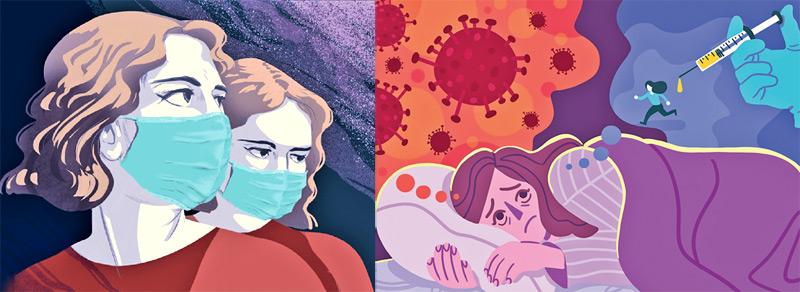
Since the pandemic outbreak in 2020, the whole world went into lockdown for months. By dawn of 2021, several countries, researchers and scientists found vaccinations to combat the Covid-19 virus. Myths and theories were formed and debated. Concerns were raised by many over the vaccines. Anti-vaxers protested about choice and vaccination.
Activists, volunteers and front line health workers campaigned for the importance of it.
Yet, a certain population is still reluctant to take the vaccine and some are faking their vaccination process, especially there’s reluctance for vaccination among youngsters assuming that it will affect their fertility.
Sunday Observer Spectrum spoke to medical experts and those actively involved in the vaccination process on busting the myths, theories and importance of getting vaccinated.
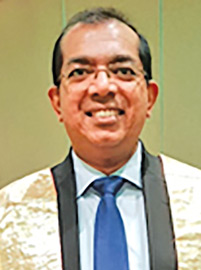 Dr C M Asela Anthony
Dr C M Asela Anthony
Consultant family Physician
What are your thoughts on the current vaccination process?
At present, the vaccination process is running smoothly. People are eager to take the vaccine. As far as I know, no major side effects have been reported for any vaccine brand up to now in Sri Lanka.
Vaccination is the only method that is available to reduce complicated Covid infection and to reduce Post Covid and long Covid illnesses in addition to reducing infection and spread of the disease. My advice to all is to get the vaccination as soon as possible, whatever the brand is available in your area.
The under 30 age group is particular one vaccine, your advice to them?
Many youngsters are planning to go abroad for studies, to work and who are planning to migrate. They are scared that if a particular vaccine is not taken, they will not not be allowed to enter a particular country.
Those persons who have already completed the paperwork can get a particular vaccine through special vaccination centres. For those who have not completed the paperwork, my advice is to take whatever vaccine that is available for them now in their area, as there is a high risk of contracting Covid infection. That will help the country as a whole to curtail the spread of the infection and to get back to normalcy. This will also help these youngsters to process their papers and achieve their ambitions soon.
In my opinion, no country in the world should say not to enter the country if you have not had a particular vaccine. That is unethical and unfair as many in those countries have not taken any vaccine. At present, I know some countries are imposing these regulations, sort of vaccine passports. But that is not a practical solution. What these countries should do is, if they don’t accept the vaccine that has been taken by the traveller, they should be quarantined for 14 days on arrival and at the end do a RT-PCR.
How can misconceptions of vaccinations be busted?
The best way to bust the misconceptions is to inform the public regarding the benefits of the vaccination. Social media platforms have become such a powerful information sharing means, going beyond mainstream media. There is false information circulating in social media regarding vaccination and hampering the vaccination drive. We have to overcome this false information and put forward the correct information and show the multiple benefits of vaccination.
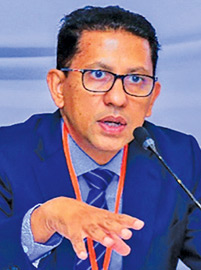 Dr Surantha Perera
Dr Surantha Perera
MBBS, DCH, MD, FRCPE, FRCPCH /Consultant Paediatrician /President PAPHSL, Past President PSSL / Editor SLJPM and Genesis / Convener MCH Co Group for Covid 19
Vaccination of children is important. When we look at the data and consider risk benefits, especially children with special health problems would benefit
What are your thoughts about the vaccination hesitancy and myths surrounding it?
All vaccines available in Sri Lanka (Sinopharm, Pfizer, Sputnik, Moderna) in Sri Lanka are more or less equally effective in preventing serious outcomes in Covid -19 infection. At the earliest opportunity, the best thing is to get the available vaccine. Especially with the Sinopharm two weeks after the second dose, only a person will get adequate protection. Locally done research had proven high seroconversion among 20 to 39 years old (99%) although the seroconversion rates in more than 60 years were relatively lower (93%).
Currently, the under 30 age group is reluctant to get vaccinated, how can the misconception be busted?
Just above one-third of the population in this category has been vaccinated. Some youth look for Pfizer vaccine over the Sinopharm thinking it will be a plus point when they want to go abroad. Most of the countries control immigration at these times through quarantine laws and many won’t get a chance to go abroad. The best thing is to get the vaccine available. From time to time these decisions are changed and WHO has advised many countries not to be selective on vaccines if they use them as a Vaccine Passport.
Some worry about sexual dysfunction and infertility related to vaccines and it does not have a scientific basis. Viral infections can cause infection in the reproductive tract and Covid -19 virus may be one of them. But vaccination provides protection rather than the opposite effect.
How are parents reacting to the vaccination process?
Many parents are keen to get vaccines and they are being provided to discuss any questions they have with us. We are in the process of creating V- Safe hotline for parents to ask their questions before and after vaccination. They can directly access child specialists and physicians through this hotline.
Covid-19 vaccines should protect your child from getting seriously ill from Covid-19 if they have certain health conditions. It will also protect healthy children from mild to severe Covid-19 illness, multisystem inflammatory syndrome due to Covid-19, the risk of developing ‘long Covid and #39; symptoms such as tiredness and fatigue and spreading Covid-19 to others. Children who are vaccinated will be less likely to miss school and other activities because of being ill with Covid-19.
Your advice to parents about the vaccination?
Vaccination of children is important. When we look at the data and consider risk benefits, especially children with special health problems would benefit. We can sub categorise them into three groups. The first group include children with specific diseases like thalassemia, diabetes, immune deficiency, cancer survivors, children on long term medications. The other two groups are children with special needs and learning difficulties e.g. Autism and Down syndrome. In the initial phase, the Health Ministry has advised only to vaccinate this specific group of children above 12 years with the Pfizer vaccine. Later on, depending on the outcomes health officials may consider 16 years and above. But Health Ministry has not given any recommendation on this.
Vaccines can cause side effects. Most of these are mild or moderate in children and do not last long.
Side effects can include a sore arm, fever or tiredness. Very rarely some children aged 12 or more overdevelop inflammation of the heart and they will recover from myocarditis and pericarditis on their own but they need treatment in hospital.
Vaccination will be done in hospitals under the supervision of child specialists. Parents can also talk to a child specialist about any concerns about Covid-19 vaccines. The doctors will explain to the child about vaccination and answer their questions since many are in their adolescent years and their concerns are respected.
Despite vaccination parents and older children should practise handwashing and wearing face masks which will help to prevent the spread. Once the schools are opened all children should adhere to given guidelines irrespective of the vaccination status.
What is the best process to vaccinate children?
Children would be vaccinated in hospitals with precautions for any reactions under the supervision of a child specialist. If your child is attending a medical clinic in a hospital best thing is to enquire about the eligibility of the vaccine. All information on vaccines would be available on the Health Ministry website very soon.
You have the right to decide about giving the vaccine to the child. You may decide to wait for further scientific data on the vaccination of children. You need to fill a form and give your consent for vaccination.
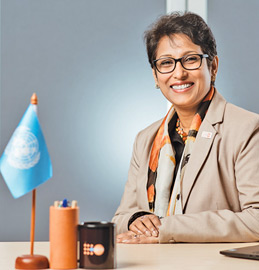 Madusha Dissanayake
Madusha Dissanayake
Head of office - United Nations Population Fund (UNFPA) Bhutan and Assistant Representative - Sri Lanka
Most of us also know Bhutan is the first country to vaccinate all its eligible population and it has given some lessons to the rest of the world especially around how and what they did differently
What is your current understanding of the vaccination process in Lanka and the South Asian region?
My responses will have three perspectives, my experiences as a UN Country Team member for Bhutan, my years of experience in the health promotion arena and my views on individual and communal beliefs and behaviours as an anthropologist.
Six months ago when I started working in Bhutan, I knew the country’s population is smaller than that of Colombo district, yet the way they are dispersed, 20 per square Km compared to 341 per sq Km in Sri Lanka does bring different challenges, though for a communicable disease it may be a positive aspect, at the same time it wasn’t only demographic challenge but a geographic challenge as well (challenging terrain and sharing its borders with the two largest Covid-19 affected countries, India and China) As UNFPA our task was mainly to see how best we could support the country to safeguard all women and girls, especially to prevent mortalities, morbidities and violence due to Covid-19 and its related situational changes observed to prevent transmission of the virus.
However, most of us also know Bhutan is the first country to vaccinate all its eligible population and it has given some lessons to the rest of the world especially around how and what they did differently.
With so many theories for vaccinations, what would you say to those still considering the vaccines?
Bhutan as Sri Lanka was the first to receive its first batch of AstraZeneca – Covis shield vaccines as a donation from its closest neighbour, India. Yet, Bhutan’s strategy on vaccination began later than that of Sri Lanka but it had many carefully mapped cultural, religious and traditional elements built into the overall campaign roll-out. Years ago, a similar campaign was rolled out for HIV prevention in Thailand, so it is not only tried and tested and not limited to Bhutan but employing those lessons learnt from those theories of medical; social anthropology is critical for public health interventions on any day because issues pertain to human behaviour based on their lived experiences.
The under 30 age group is particular about a vaccine. What is your advice to them and the older age group that is still hesitant to get vaccinated ?
How often a regular Sri Lankan receives a vaccine when they are older? How often have we been asked to make choices about vaccines in the recent or known past in any of our lives? This being the majorities reality, we need to understand how health-seeking behaviour had been established within each of us as adults beyond our parents deciding to immunise as part of a mandatory process, which most of us have now forgotten.
I think it’s important to have an awareness or an understanding of what you take and I suppose it’s the duty of those working in public health to use the best health promotion modalities to communicate the correct information in the best way that it is understood as per each person’s level of understanding and experience in life. While many countries in this region managed to eliminate polio, it was a struggle for Pakistan.
Due to myths and misconceptions many Pakistani communities had around Polio drops, it was hugely resisted by families, even though the same medicine was being administered in many other countries. Whether you are 25 or 60, people are bombarded with different types of information, most of which they did not even look out for but, it does influence their decision making if it's repeatedly said and also being repeated by those that have gained some trust among the public.
The success of Bhutan’s vaccination program can be further attributed to a group of volunteers known as guardians of Peace, initiated under the patronage of the King of Bhutan and much respected by communities. They delivered vaccines to healthcare facilities and made sure people turned up for the vaccination. Every effort in public health campaigns cannot be done through funds, we must remember that for success in such situations, volunteerism plays a pivotal role.
Finally, I liked to say the success we enjoy in Bhutan is due to the collaborative leadership of HM the King and the entire Royal Family, the Prime Minister, who is also a Physician and the Minister of Health, who is an epidemiologist, where policy decisions were completely based on evidence, data, which also showed how much the health strategies need to be in sync with cultural and religious traditions.
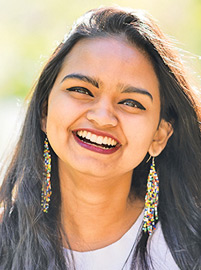 Kavindya Thennakoon
Kavindya Thennakoon
Instructional designer and educator
As a young activist advocating for change in Lanka and the world, what are your thoughts about vaccination?
Getting vaccinated is a duty we have for ourselves and more importantly for the community around us -our family, our friends and neighbours. Vaccines have saved the world - history has shown us that, from polio to smallpox we have seen how vaccinations can at times eradicate a deadly disease or in other cases successfully reduce the spread. This should be the story we tell about Covid-19 too.
Your advice to anti-vaxers and those wanting a particular vaccine?
It is okay to feel nervous and hesitant about getting a vaccine – you are concerned about your health and well-being but the key is to equip yourself with the right information. I would ask you to do three things if you are feeling hesitant:
Talk to your doctor or PHI about the questions you have. To clear any doubts. It’s so important that you talk to someone with medical expertise. A message you got on WhatsApp or saw on Facebook might not be accurate information! So always verify.
On social media follows pages like the Sri Lanka Health Promotion Bureau and The World Health Organization (WHO) so that you have a regular flow of verified, accurate information about the vaccine.
You can dial 247 - and talk to a medical professional from the Sri Lanka Medical Association (SLMA) for free! And they can answer all your questions about the vaccine, its benefits and how it will impact your health.
The under 30 age group in Sri Lanka is reluctant to get vaccinated due to the theories surrounding the vaccinations. What do you have to say about this?
I would say - do your research and get access to verified, accurate information. I got the Johnson and Johnson vaccine in March 2021. This was the fastest vaccine I had access to since it was just one dose - there were many rumours around its effectiveness. I did my research, spoke to a doctor and found out that only seven people in 1 million people who got vaccinated had adverse side effects - which shows that all vaccines are safe and clinically tested. So, I confidently got the vaccine and I am alive today because I got the fastest vaccine, I had access to.
And what do you have to say to those still deciding to get vaccinated?
We have a responsibility for those around us and ourselves. I am alive today because I got the vaccine, I had the fastest access to. Every single day you go without the vaccine – you are putting yourself and those around you at risk, from infection and even death.
It is normal to feel nervous – that’s why there are trusted news sources and professionals for us to talk to about vaccines to. Let’s do our research and then get vaccinated! This is our mighty step in ensuring the world is safe.
